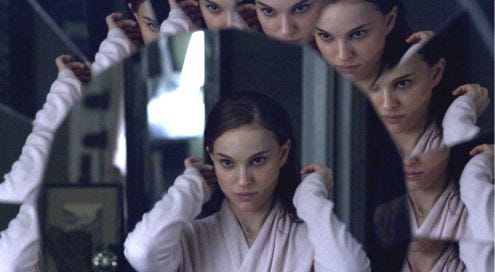Black Swan
Who'd have thought ballet would have so much in common with professional wrestling?
In our "Heroes of the Zeroes" piece of Aronofsky's "The Wrestler," we called "Black Swan" the "feminine version" of Aronofsky's previous film, and a right accurate comparison that is. Both Randy "The Ram" (played by Mickey Rourke) and "Swan" protagonist Nina (Natalie Portman) work in the world of showbusiness, albeit polar opposites in terms of what is considered culturally relevant. Both are worn to the nub physically and emotionally by their professions and are struggling to remain (in Ram's case) and become (in Nina's case) relevant and find the lights they work under white hot.
Nina is a ballerina, emotionally stunted by her overbearing live-in mother (a simmeringly unhinged Barbara Hershey). She is, then, unable to cope with her neuroses, which are passed through her high-pressure, ultracompetitive profession, and returned to her as borderline paranoia. All around her are women who are biting, scratching and clawing to get to the top, or doing the same to stay there.
Nina is as technically gifted as they come, but her director Thomas (Vincent Cassel) chides her lack of passion and charisma, those intangible things that cannot come with repetition, intense concentration, or instruction. He implores her to experience the baser things in life, and even takes to seducing her and encouraging her to do things that in the corporate world would get him slapped with a lawsuit. Or is he merely trying to motivate her?
The theater's next production is "Swan Lake," whose lead requires someone technically proficient to play the dualities of the lead role: someone technically proficient to play the White Swan, but passionate and seductive to play the Black Swan.
Soon Nina meets and befriends Lily (Mila Kunis), a dancer who seems to be everything Nina is not: carefree, happy-go-lucky and unafraid of her sexuality.
It's here that Nina begins her descent into the madness of the Swan character. She doesn't know who she can trust, least of all herself. The pressure is clearly getting to her: she has scratches on her body she can't explain (and a history of hurting herself), and as opening night approaches Nina begins turning on herself, hallucinating that her reflection is watching her and that she's taking on physical characteristics of her character. Or is she?
Portman gives a powerhouse performance as a graceful ballet star who is incredibly insecure and ill-prepared to deal with adult life, doubly important given the savvy she needs in her line of work. Her scenes with Hershey are wonderful as they turn from uncomfortable mommy-daughter play-acting time (including scenes where Hershey brushes her hair and trims her nails, and later puts her on a whopper of a guilt trip for not taking a piece of cake) to a more contentious teenage-mom-daughter rebelliousness as Nina goes clubbing with Lily.
As for that much-ballyhooed girl-on-girl romp between Kunis and Portman, yeah it's there, but it's short and not as tawdry as we've allowed ourselves to think, and for what is otherwise a serious film there's a very funny payoff to it.
I'm leaving out a lot, but "Black Swan" is a nightmarish experience, one of those films that are best experienced rather than being told about. It's one of the best films of the year and, like much of Aronofsky's best work, is a startling film that succeeds on several levels.



